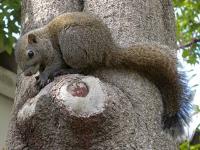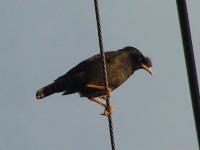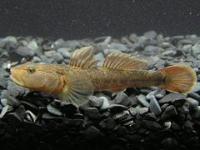The text is from here.
naturalized species in Yokohama
Last updated on November 7, 2024.
naturalized species in Yokohama
"naturalized species" refers to living organisms that were not originally in the area but came from other areas through human activities. In Yokohama, there are many creatures that originally lived and did not grow in Yokohama, such as those brought in as pets and became wild or those that were attached to ships. The figure below shows the number of species of naturalized species and their percentage of organisms (fish, benthic animals, and adhering algae) found in biological surveys in rivers. The number of species of river organisms is increasing overall along with the improvement of the water environment, but the proportion of naturalized species is gradually increasing, and biodiversity unique to Yokohama is being lost.

naturalized species seen in the city
In the city, countless alien species inhabit and grow, some of them are here.

Kurihara Squirrel (Taiwan Squirrel)
It lives mainly in the southern part of the city and is expanding its distribution. There is damage such as peeling the bark or biting the telephone line.

Mint butterfly
A group of starlings found mainly in the southern part of the city. It was painted on porcelain and shohekiga in the Edo period, but originally did not live in Yokohama.

Red horsetail
Butterflies that are artificially dispersed and whose distribution is expanding. It can be found throughout the city. The pattern varies depending on the season.

Kawayoshinobori
A group of gobys distributed in West Japan. I didn't originally live in Yokohama, naturalized species, Japan.
Some naturalized species is subject to pest control as damage or potential damage to ecosystems, human life and body, agriculture, forestry and fisheries, but it is difficult and requires a great deal of effort to eradicate naturalized species, which has once spread outdoors.
In order to connect Yokohama-like biodiversity to future generations, the principle of naturalized species is "do not enter," "do not throw it away," and "do not spread it."
About raccoon, hakubushiin, etc. (page of environmental activity business section)
Inquiries to this page
Green Environment Bureau Institute of Environmental Science, Environmental Conservation Department
Phone: 045-453-2550
Phone: 045-453-2550
Fax: 045-453-2560
E-Mail address [email protected]
Page ID: 554-603-684







